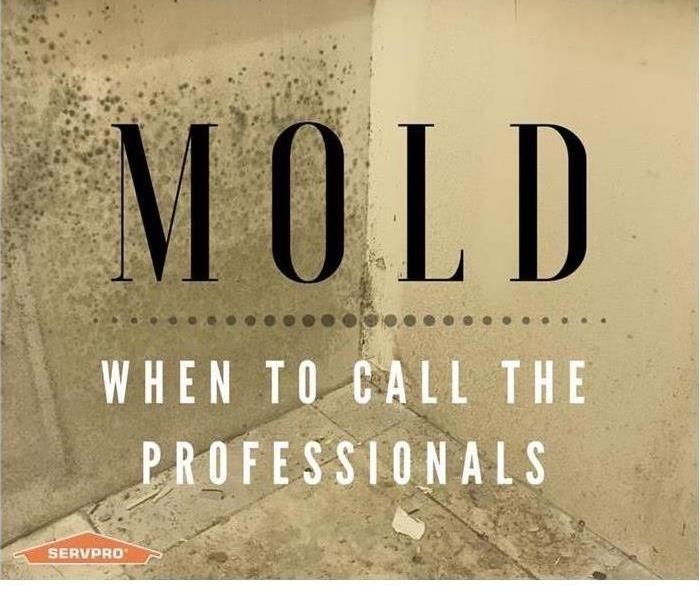Recent Mold Remediation Posts
Top 5 Household Areas Prone to Mold Growth and How to Prevent It
1/2/2025 (Permalink)
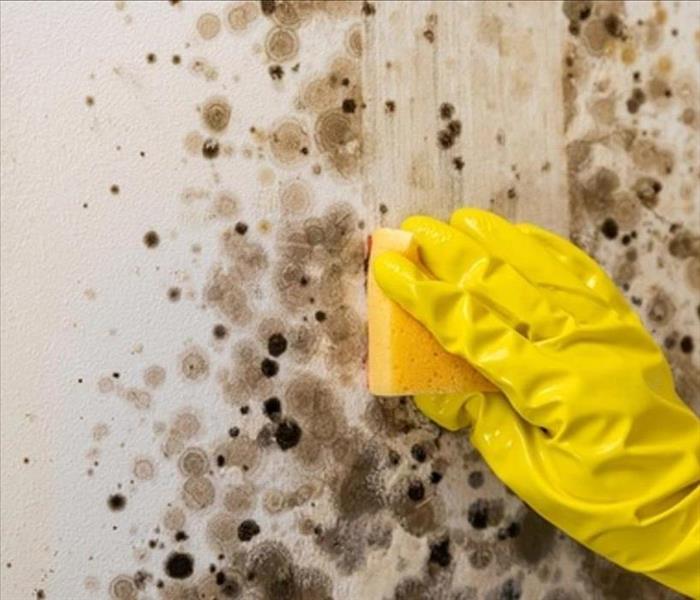 SERVPRO of Jefferson City can help with mold growth in your home
SERVPRO of Jefferson City can help with mold growth in your home
SERVPRO of Jefferson City deals with mold damage in many different areas of the home. Mold growth is a common problem in many households, posing risks to both property and health. Mold thrives in damp, dark, and humid environments, often going unnoticed until it becomes a significant issue. Knowing where mold is most likely to grow can help you take preventative measures. Here are the top five household areas prone to mold growth and tips to prevent it.
1. Bathrooms
Bathrooms are a prime location for mold due to high humidity levels from showers, baths, and sinks. Moisture can accumulate on walls, ceilings, and tiles, providing the perfect conditions for mold to thrive.
Common Mold Hotspots:
Prevention Tips:
Use an exhaust fan or open a window during and after showers to reduce humidity.
Regularly clean and dry shower surfaces and curtains.
Fix any leaky faucets or pipes immediately.
Use mold-resistant paint and materials in bathroom renovations.
2. Kitchens
Kitchens also see frequent moisture from cooking, dishwashing, and refrigerator condensation. Leftover food crumbs and organic materials add to the problem, providing nutrients for mold.
Common Mold Hotspots:
Prevention Tips:
Wipe down surfaces regularly and clean up spills promptly.
Use a dehumidifier or exhaust fan to reduce humidity during cooking.
Check for leaks in plumbing and around appliances.
Empty and clean trash bins frequently.
3. Basements
Basements are notorious for mold growth due to their dark, damp conditions and proximity to the ground. Poor ventilation and occasional flooding make them especially vulnerable.
Common Mold Hotspots:
Walls and floors, particularly concrete
Around water heaters and HVAC systems
Stored items, especially cardboard boxes and fabrics
Prevention Tips:
Install a dehumidifier to maintain low humidity levels.
Seal foundation cracks and ensure proper drainage away from the home.
Elevate stored items off the floor and use plastic bins instead of cardboard.
Insulate pipes to prevent condensation.
4. Attics
Mold in attics often results from poor ventilation or roof leaks. Warm air from the home rises and condenses in the cooler attic space, creating moisture that can lead to mold.
Common Mold Hotspots:
Prevention Tips:
Ensure proper ventilation with vents or fans.
Inspect the roof regularly for leaks or damaged shingles.
Install proper insulation to prevent condensation.
Check and clean attic vents to keep airflow unobstructed.
5. Laundry Rooms
Laundry rooms are often warm and humid, especially if there’s inadequate ventilation. Washing machines, particularly front-loading models, can trap moisture and become breeding grounds for mold.
Common Mold Hotspots:
Prevention Tips:
Leave washing machine doors open after use to allow drying.
Clean washing machine seals and dispensers regularly.
Vent dryers properly to the outside of the home.
Fix any leaks promptly and wipe down wet surfaces.
Conclusion
Understanding where mold is most likely to grow in your home is the first step to preventing it. By addressing these high-risk areas with proper maintenance and preventative measures, you can significantly reduce the likelihood of mold growth and protect your family’s health and your property. If mold does appear, act quickly to clean it or seek professional remediation services to prevent further damage.
Understanding the Diverse Causes of Mold Formation | SERVPRO of Jefferson City
4/25/2024 (Permalink)
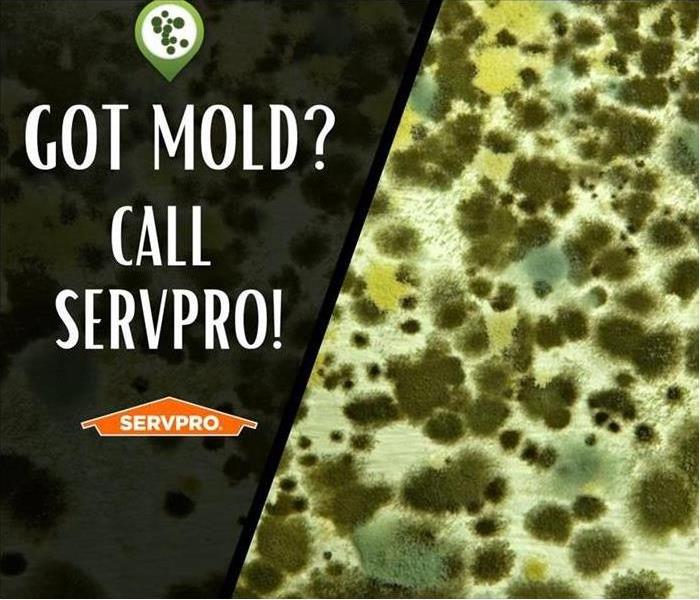 SERVPRO of Jefferson City is here to help with mold damage and remediation
SERVPRO of Jefferson City is here to help with mold damage and remediation
Mold is a common and potentially problematic issue that can affect homes and buildings. Its presence not only poses risks to the structure but can also have adverse effects on the health of those living or working within the space. To effectively combat mold, it is crucial to understand the various ways it can form in different environments.
1. Excess Moisture
Mold thrives in damp and humid conditions, making excess moisture the primary factor in mold formation. Several scenarios contribute to elevated humidity levels:
a. Leaky Roofs and Windows:
- Leaks in roofs or around windows allow water to seep into the structure, creating an ideal environment for mold growth.
b. Poor Ventilation:
- Inadequate ventilation can lead to stagnant air, allowing moisture to accumulate and mold to develop.
c. Plumbing Issues:
- Leaky pipes, whether hidden or visible, can introduce water into walls, floors, and ceilings, providing a breeding ground for mold.
d. Basement Dampness:
- Basements are prone to dampness, especially if they are not properly waterproofed. This can lead to mold formation on walls and floors.
2. Floods and Water Damage
Homes and buildings that have experienced flooding or significant water damage are at an increased risk of mold formation. The prolonged presence of moisture following a flood creates conditions conducive to mold growth. Quick and thorough drying is essential in such situations.
3. Condensation
Condensation occurs when warm, moist air comes into contact with a cold surface, leading to the formation of water droplets. Areas prone to condensation include:
a. Windows:
- Condensation on windows can create an environment where mold can thrive on window sills and frames.
b. Cold Walls:
- Exterior walls that are not properly insulated can attract condensation, fostering mold growth.
c. Cold Water Pipes:
- Pipes carrying cold water can accumulate condensation, potentially leading to hidden mold growth.
4. High Humidity
Regions with naturally high humidity levels are more susceptible to mold problems. Coastal areas or places with tropical climates often face challenges in maintaining low humidity, making them prone to mold-related issues.
5. Improperly Sealed Buildings
Buildings that are not properly sealed are more susceptible to external moisture infiltration. This can happen through gaps in walls, roofs, or windows, providing an entry point for water and creating an environment conducive to mold formation.
6. Damp Construction Materials
During construction or remodeling, if building materials are exposed to rain or high humidity and are not adequately dried before installation, they can harbor mold. This hidden mold can later become a problem as the building ages.
7. Airborne Mold Spores
Mold spores are naturally present in the air both indoors and outdoors. While they are usually harmless in low concentrations, when provided with the right conditions, these spores can settle and multiply, leading to mold infestation.
8. Household Activities
Certain household activities can inadvertently contribute to mold growth:
a. Drying Clothes Indoors:
- Hanging wet clothes to dry indoors can introduce excess moisture into the air.
b. Cooking without Proper Ventilation:
- Cooking, especially boiling or frying, releases moisture into the air. Without proper ventilation, this can lead to mold problems.
c. Indoor Plants:
- Overwatering indoor plants can increase humidity levels, creating an environment favorable to mold.
Preventing and Addressing Mold Issues:
Understanding the various causes of mold formation is crucial, but so is taking preventive measures and addressing existing problems promptly. Here are some preventive steps and solutions:
a. Maintain Proper Ventilation:
- Ensure that your home or building is adequately ventilated to prevent the accumulation of stagnant air and moisture.
b. Address Leaks Promptly:
- Repair any leaks in the roof, windows, or plumbing as soon as they are identified.
c. Use Dehumidifiers:
- Employ dehumidifiers in areas prone to high humidity, such as basements or bathrooms.
d. Improve Insulation:
- Properly insulate walls and windows to reduce the likelihood of condensation.
e. Regular Maintenance:
- Conduct regular inspections of the building, checking for leaks, and ensuring proper drainage.
f. Promptly Address Water Damage:
- If your home has experienced flooding or water damage, take immediate steps to dry and sanitize the affected areas.
g. Control Indoor Humidity:
- Maintain indoor humidity levels between 30-50% to discourage mold growth.
h. Properly Seal Buildings:
- Ensure that the building is properly sealed to prevent water infiltration.
i. Use Mold-Resistant Products:
- Consider using mold-resistant building materials, especially in areas prone to dampness.
j. Professional Mold Remediation:
Conclusion: Vigilance and Proactivity are Key
Mold formation can result from a combination of factors, making it essential to remain vigilant and proactive in preventing and addressing potential issues. By understanding the diverse causes of mold growth, individuals can take steps to create an environment that is inhospitable to mold, ensuring the health and longevity of their homes and buildings. If mold damage becomes an issue, don’t hesitate to call the remediation professionals at SERVPRO of Jefferson City.
Defeating Mold Damage: Expert Strategies for a Mold-Free Home | SERVPRO of Jefferson City
9/27/2023 (Permalink)
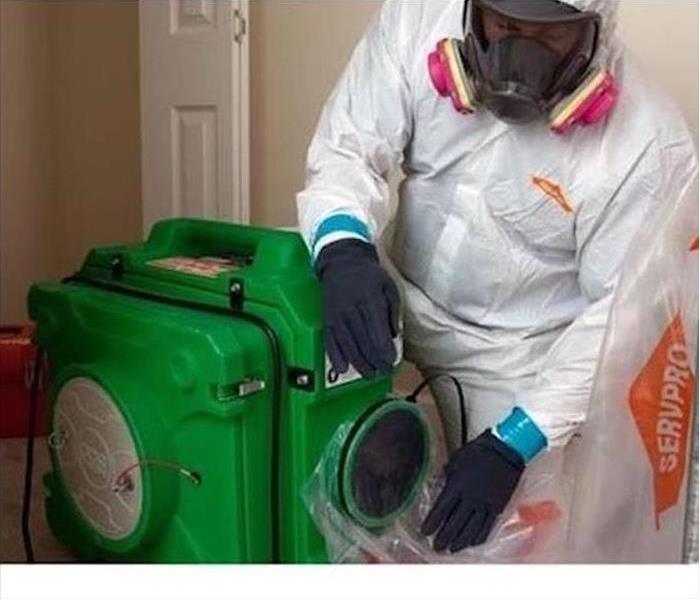 SERVPRO of Jefferson City is your trusted choice for mold removal and remediation. Call us today at (573) 635-5883
SERVPRO of Jefferson City is your trusted choice for mold removal and remediation. Call us today at (573) 635-5883
If you’ve ever experienced issues with mold, you know that it’s more than just an unsightly nuisance.
Mold can silently wreak havoc on your health and property. In this extensive guide, we will delve deep into the dangers of mold, how to detect its presence, and the indispensable role of professional mold remediation services. Whether you're dealing with mold removal, mold remediation, or the costs involved, this comprehensive resource will equip you with vital knowledge to protect your Jefferson City, Missouri property.
Understanding Mold
Mold, a type of fungus, serves a vital role in nature by breaking down organic matter. However, when it infiltrates our indoor spaces, it can cause a multitude of issues. Let's explore the key aspects of mold:
• Health Risks: Exposure to mold can lead to a range of health problems. Mold spores are allergens that can trigger asthma, allergies, respiratory issues, and skin irritations.
• Black Mold (Stachybotrys chartarum): Often dubbed "toxic black mold," this species is particularly notorious for its mycotoxins, which can lead to severe health problems when inhaled or touched.
• Property Damage: Mold thrives on organic materials like wood, drywall, and insulation, causing structural damage and costly repairs.
• Airborne Allergens: Mold releases allergenic proteins that can initiate allergies, even in individuals who haven't experienced them before.
• Mold Odor: Mold produces a distinct, musty odor that permeates the environment, making your indoor space uncomfortable and unwelcoming.
Identifying Mold Damage
Early detection is crucial for effective mold remediation. In many cases, it will be necessary to call a professional mold remediation company for mold testing. Mold often grows in concealed, inaccessible areas, rendering it invisible without professional help. Here are some telltale signs of mold damage:
• Visible Mold Growth: The most apparent indication is the presence of visible mold. It can manifest as fuzzy, discolored patches on walls, ceilings, or other surfaces.
• Musty Odor: An enduring, musty smell is a strong indicator of mold growth, even if you can't see it. This scent is a result of the volatile organic compounds (VOCs) emitted by mold.
• Water Damage History: Properties with a history of water damage, flooding, or leaks are at higher risk for mold growth. Mold thrives in moist environments.
• Health Symptoms: If occupants experience unexplained health symptoms like coughing, sneezing, congestion, or skin irritation that improve when leaving the property, mold may be the culprit.
• Peeling Paint or Wallpaper: Mold can cause paint or wallpaper to peel or bubble as it grows beneath these surfaces.
The Mold Remediation Process
Mold remediation is a complex, regulated process aimed at identifying, containing, and eliminating mold to ensure the safety and health of occupants. Here's an overview of the standard mold remediation process:
Mold Inspection and Assessment
Before embarking on the remediation journey, a certified mold inspector evaluates the extent of the mold damage. They identify the type of mold, its location, and the underlying moisture source that fueled its growth.
Containment
Effective containment is vital to prevent mold spores from migrating to uncontaminated areas. Professionals utilize plastic sheeting and negative air pressure machines to isolate the affected area.
Mold Removal
The next stage involves the physical mold removal. Depending on the infestation's scale, this may entail removing and disposing of materials like drywall, insulation, or carpeting. Professionals wear personal protective equipment (PPE) and adhere to stringent safety protocols throughout this phase.
Mold Cleaning and Sanitization
All surfaces within the containment area undergo thorough cleaning and sanitization, utilizing specialized equipment and antimicrobial agents to eliminate any lingering mold spores.
Drying and Dehumidification
To prevent future mold growth, experts employ industrial-grade dehumidifiers and air movers to fully dry the affected space. Addressing the moisture source is pivotal in mold prevention.
Post-Remediation Testing
After remediation, a certified mold testing company may perform post-remediation testing to confirm the successful resolution of the mold issue and ensure safe indoor air quality.
Assessing Mold Remediation Costs
The cost of mold remediation can vary considerably based on factors such as the extent of the infestation, the type of mold, and its location within the property. Several factors may influence mold remediation costs:
• Infestation Size: Larger mold infestations typically necessitate more extensive remediation efforts, leading to higher costs.
• Location Complexity: Mold in confined or challenging-to-reach areas may require additional labor and equipment, impacting the overall cost.
• Mold Type: Hazardous molds, including toxic black mold, may necessitate more elaborate safety measures, driving up costs.
• Structural Damage: Mold that has caused structural deterioration may entail expensive repairs, such as drywall replacement or subfloor restoration.
• Insurance Coverage: Depending on your insurance policy, a portion or the entirety of the remediation costs may be covered, reducing your financial burden.
It's crucial to remember that while mold remediation costs are a concern, the health and safety of occupants should take precedence. Cutting corners during mold remediation can result in incomplete removal and recurrent mold problems.
A Mold Remediation Company You Can Trust: SERVPRO of Jefferson City
When seeking mold remediation services, it's essential to choose a reputable and experienced mold removal company. Here are some essential considerations for selecting the right professionals:
• Certifications: Seek out companies and technicians certified by renowned organizations such as the Institute of Inspection, Cleaning and Restoration Certification (IICRC) or the National Association of Mold Professionals (NAMP).
• References: Request references or peruse online reviews on sites such as Google or Yelp to gauge the company's reputation and customer satisfaction.
• Experience: Opt for a company with extensive experience in mold remediation. Their knowledge and expertise will be indispensable in handling your specific situation.
• Transparency: The chosen company should provide a detailed scope of work, including a written estimate and a clear explanation of the
In your quest for mold removal and remediation services, consider the mold remediation experts at SERVPRO of Jefferson City, experienced professionals dedicated to ensuring your safety and restoring your peace of mind.
Preventing Future Mold Infestations
After successfully remedying mold, it's imperative to implement preventive measures to stave off future mold issues. Here are some strategies to maintain a mold-free environment:
• Moisture Control: Identify and rectify moisture sources, such as leaks, plumbing issues, or inadequate ventilation. Keeping indoor humidity levels below 60% is a potent preventive measure.
• Routine Maintenance: Perform regular inspections and maintenance to spot and address potential problem areas early, before they become breeding grounds for mold.
• Proper Ventilation: Ensure ample ventilation in moisture-prone zones like bathrooms, kitchens, and basements. Consider using exhaust fans and dehumidifiers if necessary.
• Effective Drainage: Channel rainwater away from your property by maintaining gutters, downspouts, and proper grading.
• Timely Repairs: Swiftly attend to water damage issues. Do not delay in fixing leaks, roof damage, or plumbing problems that can spawn mold growth.
Conclusion
Mold damage is a formidable adversary that poses health risks, property damage, and persistence without proper management. Mold removal and remediation are tasks best entrusted to certified professionals who possess the expertise, equipment, and experience to ensure thorough and safe mold cleanup. By understanding the perils of mold, recognizing its presence, and taking proactive measures, you can safeguard your property and the well-being of your loved ones. Always remember, when it comes to mold, prevention is paramount, but prompt and effective remediation is your first line of defense.
SERVPRO of Jefferson City is here to help with your mold remediation services needs. We have 24/7 emergency services and are always available for mold testing and mold estimates. Call us today at (573) 635-5883.
Should You Get Your Jefferson City Home Tested or Sampled for Mold?
1/23/2023 (Permalink)
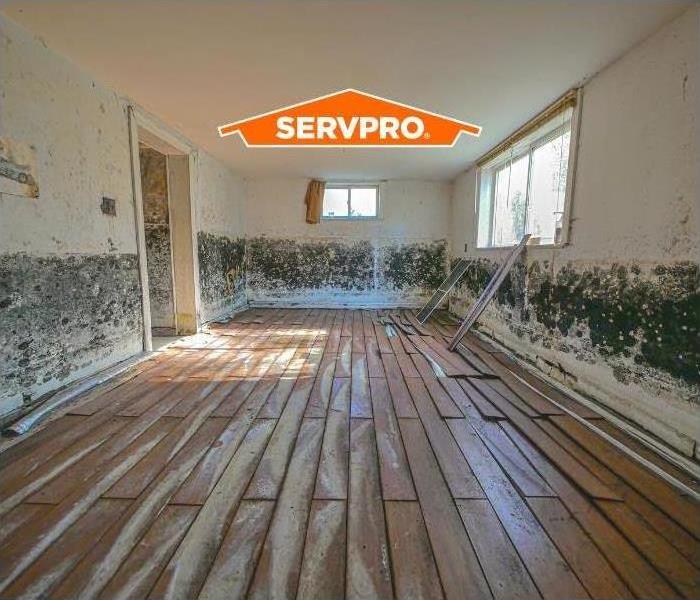 Contact SERVPRO of Jefferson City for mold mitigation
Contact SERVPRO of Jefferson City for mold mitigation
When is time to get a sample for mold? If visible mold growth is present, sampling is unnecessary.
Surface sampling may be useful to determine if an area has been adequately cleaned or remediated. Sampling for mold should be conducted by professionals who have specific experience in designing mold sampling protocols, sampling methods and interpreting results.
Sample analysis should follow analytical methods recommended by the American Industrial Hygiene Association (AIHA), the American Conference of Governmental Industrial Hygienists (ACGIH), or other professional organizations.
Are there federal regulations or standards regarding mold testing?
Standards or Threshold Limit Values (TLVs) for airborne concentrations of mold, or mold spores, have not been set. Currently, there are no EPA regulations or standards for airborne mold contaminants.
Understanding Mold
When water intrudes into your property, mold growth can start in as little as 48 hours. Consider the following mold facts:
- Mold is present almost everywhere, indoors and outdoors.
- Mold spores are microscopic, float along in the air, and may enter your home through windows, doors, or AC/heating systems or even hitch a ride indoors on your clothing or a pet.
- Mold spores thrive on moisture. Mold spores can quickly grow into colonies when exposed to water. These colonies may produce allergens and irritants.
- Before mold remediation can begin, any sources of water or moisture must be addressed. Otherwise, the mold may return.
- Mold often produces a strong, musty odor, and that odor can lead you to possible mold problem areas.
- Even higher-than-normal indoor humidity can support mold growth. Keep indoor humidity below 45 percent.
The Mold Remediation Process
Every mold damage scenario is different and requires a unique solution, but the general mold remediation process stays the same. Learn more about our mold remediation process.
- Emergency Contact - (573) 635-5883
- Inspection and Mold Damage Assessment
- Mold Containment
- Air Filtration
- Removing Mold and Mold-Infested Materials
- Cleaning Contents and Belongings
What is Performed with a Mold Remediation Protocol
2/6/2019 (Permalink)
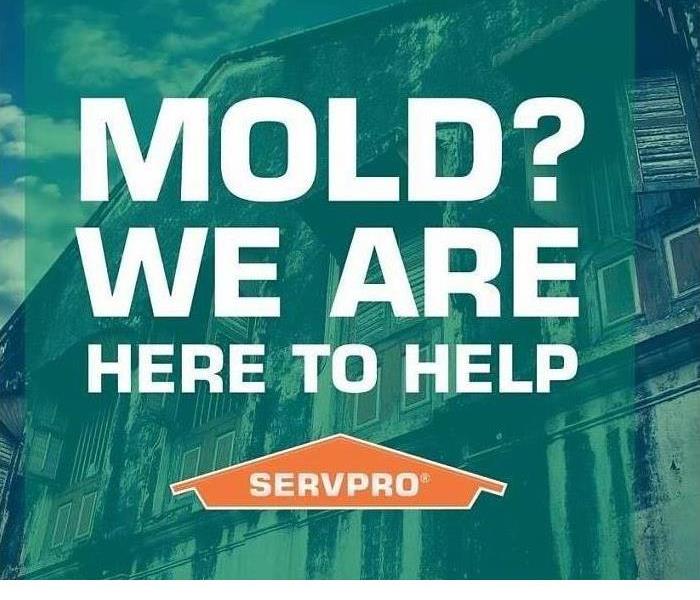 SERVPRO of Jefferson City - Here to help you with your mold remediation process- 573-635-5883
SERVPRO of Jefferson City - Here to help you with your mold remediation process- 573-635-5883
SERVPRO of Jefferson City will do a brief walk through of your home or business to inspect for possible mold growth. This is done to help you understand what will need to be done to remove any mold
If we suspect mold is present, we will contact a local trusted vendor to do a complete inspection. The vendor we use is licensed to identify types of mold and the amount of mold that is present. Our vendor will put together a full protocol which involves the following:
Interview – Review and discussion with the home or business owner of the property of current conditions which has led to the claim.
Site Assessment – A physical site assessment of the Property in the area(s) of concern to: visually assess the damage(s), retrieve temperature and RH readings, take air and direct samples for mold (if applicable), and gather room dimension to create room/floor drawings to identify the location(s) of concern.
- Air Sampling – The purpose of non-viable spore trap air sampling is to provide an approximation of the airborne microbial (fungal) spore concentrations. A minimum of one control sample is typically taken outside the most common used entrance into the building, then one or more air samples are collected in the areas of concern within the building. Elevated airborne spore concentrations may indicate an indoor microbial reservoir(s), or that cleaning of personal effects or the HVAC system(s), is a necessary component of a microbial remediation plan.
- Direct sampling – The purpose of direct sampling is to identify the type and concentration of microbial spores present on affected materials identified with suspect visible microbial growth. The sampling results are also used for reference for source contamination when air samples are taken.
Learn more about mold and what to do until help arrives by reviewing these mold damage tips https://www.SERVPROjeffersoncity.com
Identifying Mold In Your Home or Business
2/1/2019 (Permalink)
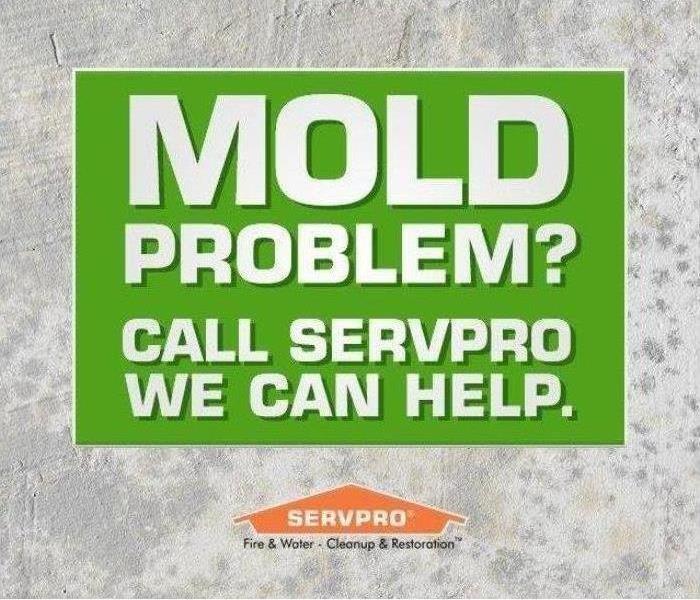 SERVPRO of Jefferson City Understands Mold
SERVPRO of Jefferson City Understands Mold
- Look for black, clustered growths, especially in warm, moist rooms. Pay attention to whether you start coughing, sneezing, or wheezing when you enter the room – even if you don’t see mold, the spores or mycotoxins can still cause symptoms.
- Look for causes of mold growth, such as a leak, lack of ventilation, or old food, papers, or wood.
- Resolve any issues causing mold growth. Throw away anything affected by mold or contributing to mold growth.
Mold can affect your health and can also cause significant damage to your property. Your SERVPRO of Jefferson City Professionals handle damages every day. We have the training, protective gear and specialized equipment necessary to remediate mold in your home or business.
If you see signs of mold in your home or business, call SERVPRO of Jefferson City at 573-635-5883.
Managing Mold In Your Home Or Business
2/1/2019 (Permalink)
Managing Mold in Your Home or Business
Here are the do’s and don’ts for keeping mold from growing indoors.
Do’s
- Clean and vacuum your home or business regularly
- Leave doors and windows open for ventilation when you bath, shower, or do other activities that can increase moisture.
- Use a dehumidifier to keep indoor relative humidity below 50 percent.
- Use an indoor air purifier with high-efficiency particulate air (HEPA) filtration or install an appropriate high-efficiency filter in your furnace or ventilation system.
- Keep your rain gutters clean and make sure water drainage is not blocked.
Don’ts
- Don’t leave old books, newspapers or wood sitting unused for long periods.
- Don’t’ put carpet in rooms like bathrooms, kitchens, or basements.
- Don’t ignore leaks from pipes or groundwater – fix them as soon as possible.
Your local SERVPRO of Jefferson City understands mold and mold growth and have the training and equipment to remediate mold in your home or business. Give us a call at 573-635-5883.
How It Works: The Mold Mitigation and Remediation Process
2/1/2019 (Permalink)
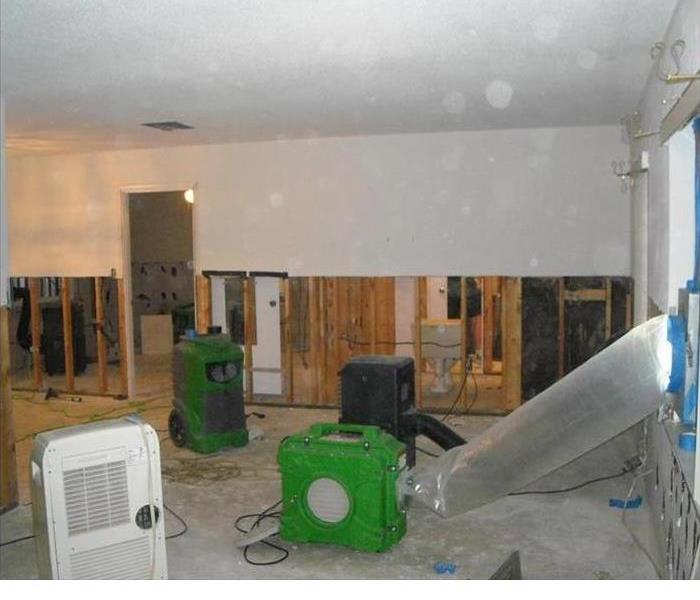 Specialized equipment is used during mold remediation.
Specialized equipment is used during mold remediation.
SERVPRO of Jefferson City has the training, protective gear and specialized equipment necessary to handle your mold problem.
GIVE US A CALL - The moment you suspect water intrusion call us 573-635-5883. Our office staff will ask you a series of questions to help determine the necessary equipment, resources and personnel needed.
THE INSPECTION AND DAMAGE ASESSMENT - Our crew will arrive at your property prepared to inspect for signs of mold using technology designed to detect mold and hidden water sources.
MOLD CONTAINMENT - Various containment procedures will be placed to prevent the spread of mold and isolate the contaminated are.
AIR FILTRATION – Specialized filtration equipment captures microscopic mold spores out of the air.
REMOVING MOLD & MOLD-INFESTED MATERIALS – The mold remediation process depends on the amount of mold growth and the types of surfaces on which the mold appears. Special treatments are used to eliminate mold colonies and help prevent new colonies from forming
CLEANING CONTENTS & BELONGINGS – SERVPRO will clean your furniture, curtains, decorative items, and other restorable items affected by mold.
RESTORATION – Restoration repairs range from minor repairs to major repairs, depending on the level of mold damage.
SERVPRO of Jefferson City understands mold and mold growth and we have the training and equipment to remediate mold in your home or business. Remember to call the cleanup team that is “Faster To Any Size Disaster” at 573-635-5883.
Mold Growth - Proper Defense is Vital
10/2/2018 (Permalink)
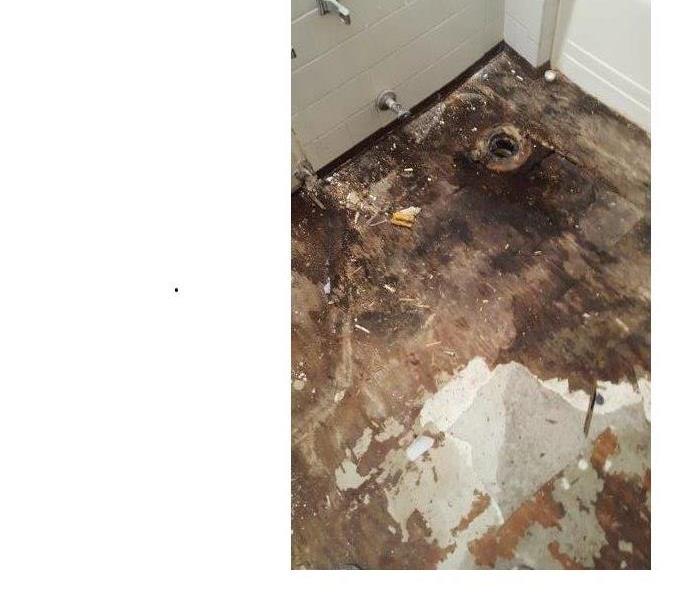 This picture depicts damage that could have been prevented.
This picture depicts damage that could have been prevented.
Prompt mitigation is vital to avoid mold growth, which can be visible in as little as 24 to 48 hours under certain conditions. Regular inspection for plumbing leaks could have prevented this homeowner's disaster. SERVPRO of Jefferson City was called to assist the homeowner with the mitigation. Most water damage, no matter how small, have the potential to cause serious structural and indoor air quality issues over time. Our crew had the equipment, training and experience to find and dry unseen water before secondary damages occur. The proper equipment made a measurable difference in reducing the damage expense during this water loss. SERVPRO of Jefferson City uses moisture sensor to detect water in the baseboards and walls; moisture meters to determine the moisture content, and thermohygrometers to measure the temperature and relative humidity.
Does Your Jefferson City, Missouri Area Home Have A Mold Problem?
6/27/2018 (Permalink)
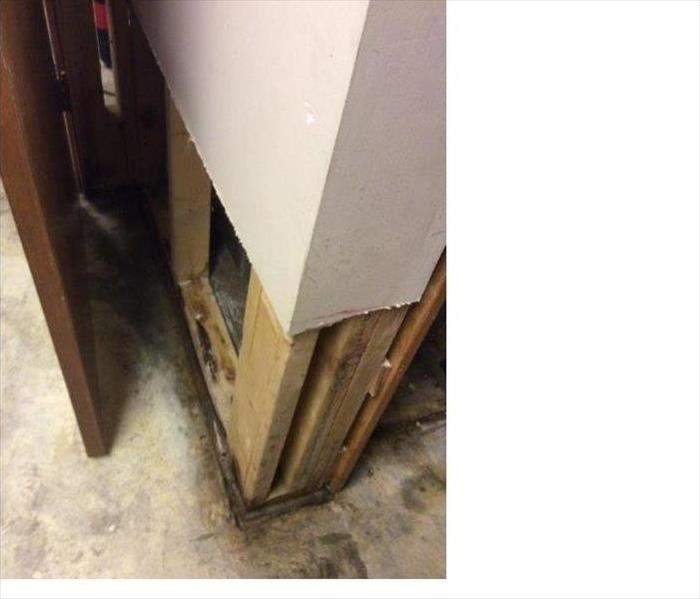 Jefferson City, Missouri, mold can spread through a home in as little as 48 hours.
Jefferson City, Missouri, mold can spread through a home in as little as 48 hours.
Microscopic mold spores naturally occur almost everywhere, both outdoors and indoors. This makes it impossible to remove all mold from a home or business. Therefore, mold remediation reduces the mold spore count back to its natural or baseline level. Some restoration businesses advertise “mold removal” and even guarantee to remove all mold, which is a fallacy. Consider the following mold facts:
- Mold is present almost everywhere, indoors and outdoors.
- Mold spores are microscopic and float along in the air and may enter your home through windows, doors, or AC/heating systems or even hitch a ride indoors on your clothing or a pet.
- Mold spores thrive on moisture. Mold spores can quickly grow into colonies when exposed to water. These colonies may produce allergens and irritants.
- Before mold remediation can begin, any sources of water or moisture must be addressed. Otherwise, the mold may return.
- Mold often produces a strong, musty odor and can lead you to possible mold problem areas.
- Even higher-than-normal indoor humidity can support mold growth. Keep indoor humidity below 45 percent.
If your home or business has a mold problem, we can inspect and assess your property and use our specialized training, equipment, and expertise to remediate your mold infestation.
If You See Signs of Mold, Call Us Today – 1-800-SERVPRO
Jefferson City area Residents: Follow These Mold Safety Tips If you Suspect Mold
6/27/2018 (Permalink)
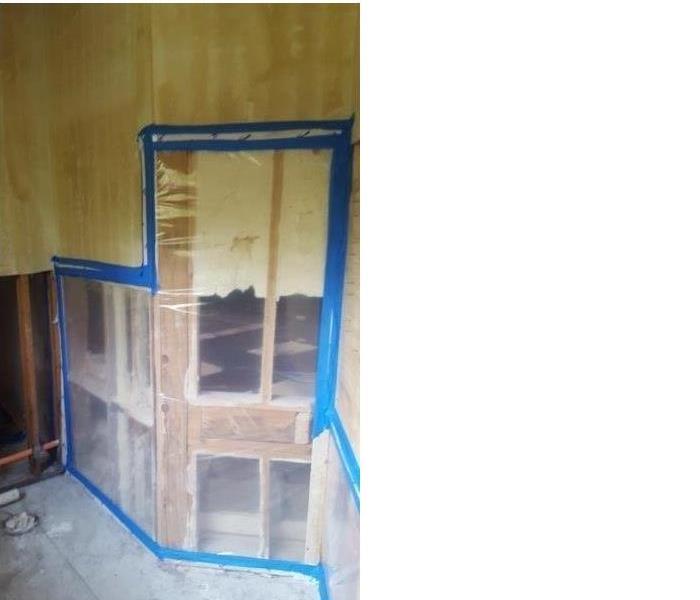 Be careful! Without proper training, you could be spreading mold throughout your home. This picture depicts a mold containment procedure.
Be careful! Without proper training, you could be spreading mold throughout your home. This picture depicts a mold containment procedure.
If you see visible mold, do not disturb it. You can inadvertently spread the mold infestation throughout your home. When mold is disturbed, the mold can release microscopic mold spores which become airborne and can circulate inside your home.
What to Do:
- Stay out of affected areas.
- Turn off the HVAC system and fans.
- Contact SERVPRO of Jefferson City for mold remediation services.
What Not to Do:
- Don’t touch or disturb the mold.
- Don’t blow air across any surfaces with visible or suspected mold growth.
- Don’t attempt to dry the area yourself.
- Don’t spray bleach or other disinfectants on the mold.
About Our Mold Remediation Services
SERVPRO of JeffersonCity specializes in mold cleanup and restoration, in fact, it’s a cornerstone of our business. Our crews are highly trained restoration professionals that use specialized equipment and techniques to properly remediate your mold problem quickly and safely.
If You See Signs of Mold, Call Us Today – 573-635-5883
Sample Blog 3 below
Highly trained to help with your Mold Remediation!
2/2/2018 (Permalink)
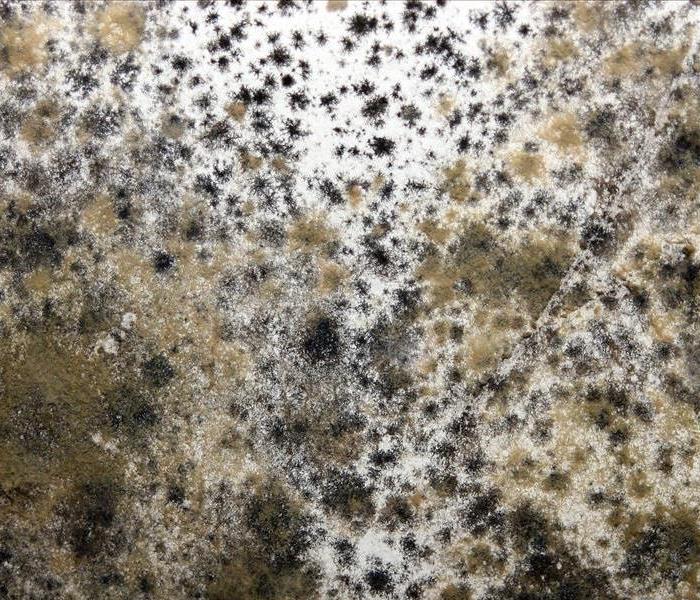 Visible Mold
Visible Mold
SERVPRO of Jefferson City is an IICRC firm. The Institute of Inspection, Cleaning and Restoration Certification (IICRC) creates the standards for the restoration industry and provides training and certification to restoration companies. IICRC Certified Firms have the right to display the IICRC Certified Logo.
IICRC Certified Firms must
• Present accurate information to consumers and conduct business with honesty and integrity.
• Require a technician on all jobs who has been formally trained and passed all required tests.
• Require a continuing education program to keep technicians up-to-date on the latest changes in the industry.
• Maintain liability insurance to protect all parties in the event of an accident.
• Maintain a written complaint policy and agree to Better Business Bureau or similar arbitration to resolve disputes, and accept the conclusions and recommendations of arbitration.
The IICRC Develops The Standards For The Restoration Industry
The IICRC has been the driving force in establishing the main industry standards and reference guides for professional carpet cleaning, water damage restoration and mold remediation. These IICRC standards take years to develop and require the coordination of experts in the field: manufacturers, industry organizations, insurance professionals, training schools, contractors, and public health professionals.
Every five years, the standards are reviewed and updated. The water damage restoration field changes rapidly with advancements in technology and science, and therefore the standards must evolve to keep pace.
About SERVPRO of Jefferson City
SERVPRO of Jefferson City specializes in the cleanup and restoration of residential and commercial property after a fire, smoke or water damage event. Our staff is highly trained in property damage restoration and we are an IICRC Certified Firm. We believe in continuous training: from initial and ongoing training at SERVPRO’s corporate training facility to regular IICRC-industry certification, rest assured our staff is equipped with the knowledge to restore your property.
Is mold covered on your insurance?
2/2/2018 (Permalink)
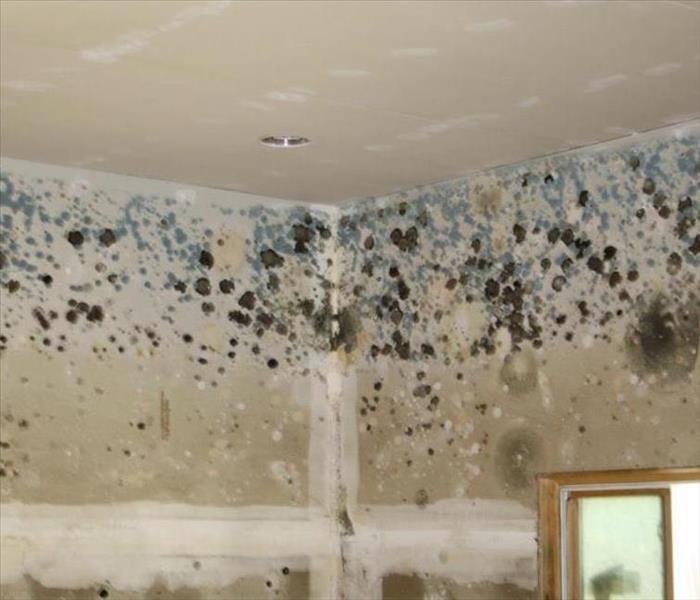 visible mold in a structure
visible mold in a structure
With all of the attention on black mold and it's potential to be toxic to the health, many homeowner's don't want to take a chance when they spot mold. Luckily, not every mold job that we look at is in fact black mold.
There are several cases in which there is a mold infestation in the home that requires our services. It can be surprising to some homeowners to discover that their insurance policy does not cover mold.
Call your insurance agent if the language of the policy is confusing and you are unsure. Some policies contain clauses that exclude mold. Some will cover mold removal only under certain circumstances. Typically, if your policy does not include mold remediation it can be added onto the policy. It's a smart preventative measure that can save you thousands in the future.
Mold Facts
2/2/2018 (Permalink)
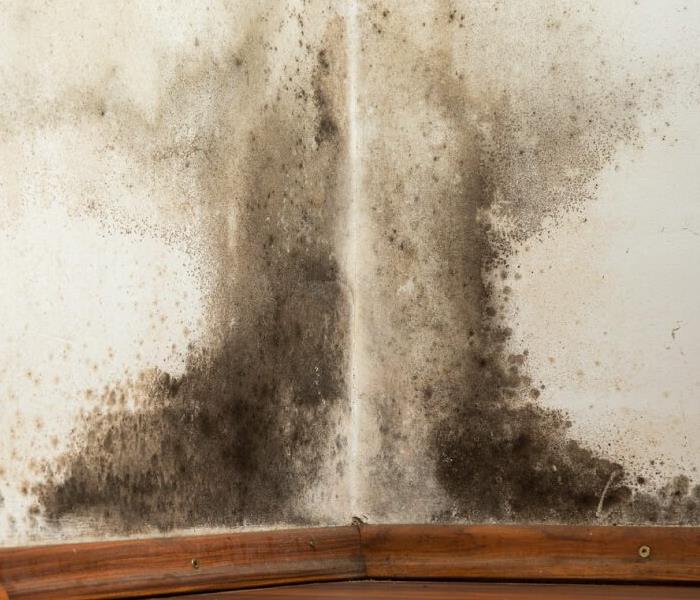 Mold can spread through a home in as little as 48 hours!
Mold can spread through a home in as little as 48 hours!
Microscopic mold spores naturally occur almost everywhere, both outdoors and indoors. This makes it impossible to remove all mold from a home or business. Therefore, mold remediation reduces the mold spore count back to its natural or baseline level. Some restoration businesses advertise “mold removal” and even guarantee to remove all mold, which is a fallacy. Consider the following mold facts:
Mold is present almost everywhere, indoors and outdoors.
Mold spores are microscopic and float along in the air and may enter your home through windows, doors, or AC/heating systems or even hitch a ride indoors on your clothing or a pet.
Mold spores thrive on moisture. Mold spores can quickly grow into colonies when exposed to water. These colonies may produce allergens and irritants.
Before mold remediation can begin, any sources of water or moisture must be addressed. Otherwise, the mold may return.
Mold often produces a strong, musty odor and can lead you to possible mold problem areas.
Even higher-than-normal indoor humidity can support mold growth. Keep indoor humidity below 45 percent.
If your home or business has a mold problem, we can inspect and assess your property and use our specialized training, equipment, and expertise to remediate your mold infestation.
If You See Signs of Mold, Call Us Today at SERVPRO of Jefferson City!
Respirator FIT for Safety
7/31/2017 (Permalink)
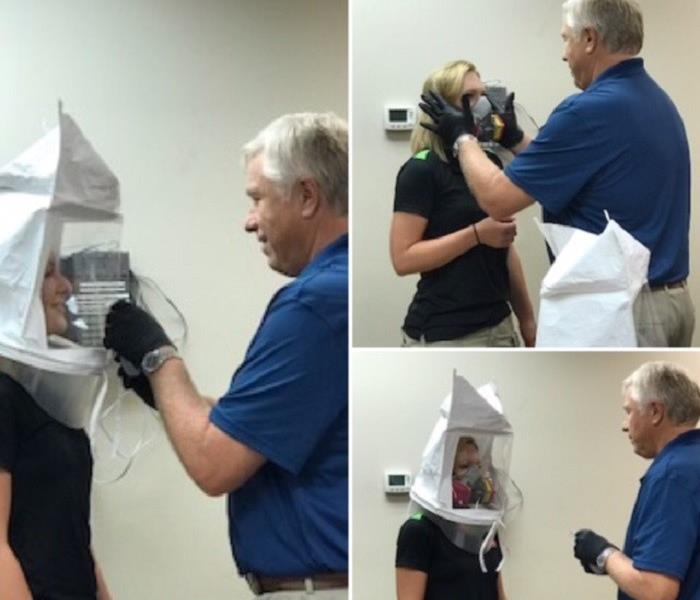 This example shows FIT testing for multiple types of respirators. Safety First!
This example shows FIT testing for multiple types of respirators. Safety First!
Here at SERVPRO of Jefferson City, many of the situations we come into contact with can be hazardous to the health. We take safety very seriously, and train our employees to properly handle each situation according to OSHA and IICRC standards for our industry. PPE (Personal Protective Equipment ) is used for each job, and in some cases, this includes the use of a respirator. There are multiple types of respirators, depending on the circumstances of the job and the potential hazard. Examples of situations requiring the use of a respirator may include Mold remediation, smoke and heavy soot, Thermal fogging, and sewage clean up, among others. Respirators must be checked regularly to ensure a proper fit. Here you can see one of our technicians being fitted for respirators. Continuous training and safety testing is just one of the ways our team is working to not only keep us safe, but to ensure we can always be there for you.






 24/7 Emergency Service
24/7 Emergency Service






